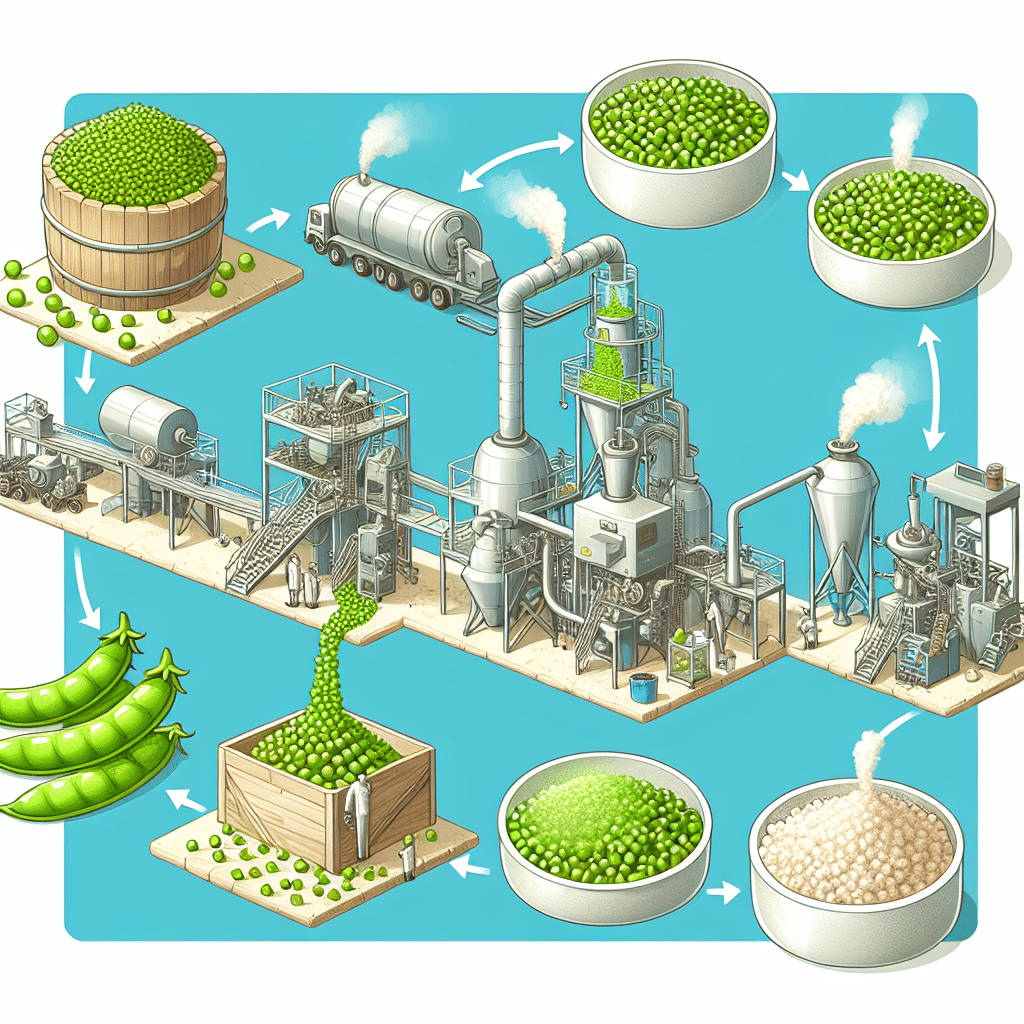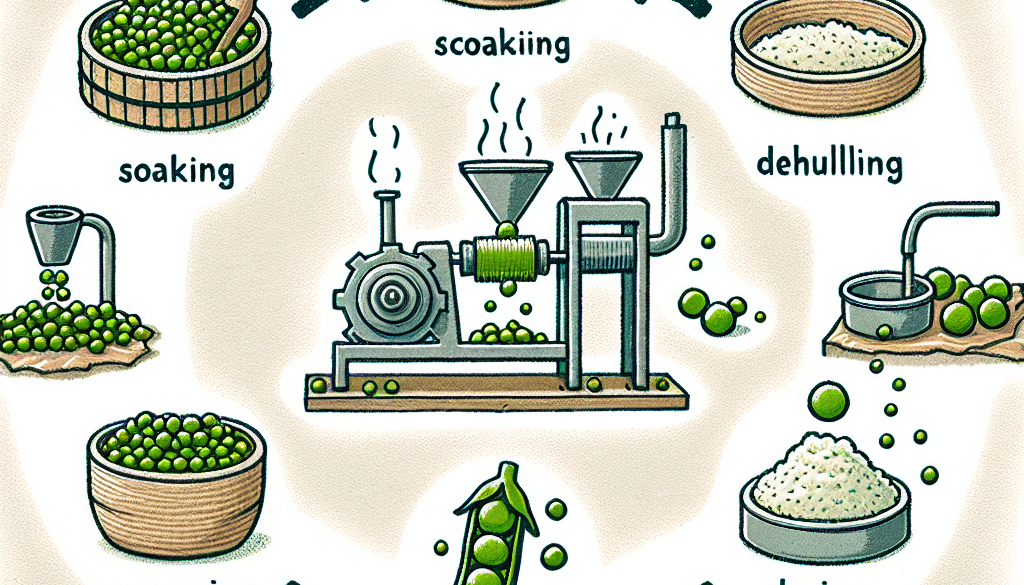Is Textured Pea Protein Highly Processed?
-
Table of Contents
- Textured Pea Protein: Assessing Its Level of Processing
- Understanding Textured Pea Protein
- The Production Process of Textured Pea Protein
- Is Textured Pea Protein Considered Highly Processed?
- Health Implications of Consuming Textured Pea Protein
- Environmental and Ethical Considerations
- Case Studies and Statistics
- Conclusion: Balancing Nutrition and Processing
- Discover ETprotein’s High-Quality Protein Products
Textured Pea Protein: Assessing Its Level of Processing

As the demand for plant-based proteins continues to rise, textured pea protein has emerged as a popular ingredient in many vegan and vegetarian products. However, with the increasing consumer interest in whole foods and minimally processed ingredients, questions arise about the processing involved in creating textured pea protein. This article delves into the production process of textured pea protein to determine how processed it is and what that means for consumers.
Understanding Textured Pea Protein
Textured pea protein is derived from yellow peas, which are a sustainable and high-protein legume. The protein is extracted and processed to create a texture that resembles that of meat, making it a favored ingredient in plant-based meat alternatives. To understand whether textured pea protein is highly processed, it’s essential to examine the steps involved in its production.
The Production Process of Textured Pea Protein
The journey from pea to textured protein involves several stages:
- Harvesting: Yellow peas are harvested and cleaned to remove impurities.
- Milling: The peas are milled into flour, which contains protein, starch, and fiber.
- Protein Isolation: The protein is separated from the starch and fiber through a process of wet fractionation, which often involves water, enzymes, or mild processing aids.
- Drying: The isolated protein is then dried to produce pea protein concentrate or isolate, depending on the protein content.
- Texturizing: The dried protein is hydrated and subjected to a high-temperature, high-pressure process called extrusion, which gives it a fibrous structure similar to meat.
While this process may seem complex, it’s important to note that many food items undergo similar levels of processing to achieve the desired texture and functionality.
Is Textured Pea Protein Considered Highly Processed?
When evaluating the degree of processing, textured pea protein can be considered moderately processed. It does not involve harsh chemicals or solvents typically associated with highly processed foods. Instead, physical processes like extrusion are used to alter the protein’s structure. However, it is more processed than whole peas or simple pea protein powder due to the additional texturizing step.
Health Implications of Consuming Textured Pea Protein
Despite being processed, textured pea protein retains much of its nutritional value. It is rich in protein and contains essential amino acids. Moreover, it is free from cholesterol and low in fat, making it a heart-healthy alternative to animal proteins. However, as with any processed food, it’s crucial to consume it as part of a balanced diet.
Environmental and Ethical Considerations
Textured pea protein is not only a health-conscious choice but also an environmentally friendly one. Peas require less water and fertilizers than animal farming, and they contribute to soil health by fixing nitrogen. Additionally, opting for plant-based proteins can reduce the ethical concerns associated with animal agriculture.
Case Studies and Statistics
Several studies have highlighted the benefits of incorporating plant-based proteins like textured pea protein into the diet. For instance, research indicates that plant-based diets can lower the risk of heart disease, obesity, and certain types of cancer. Moreover, the plant-based meat market, which heavily relies on textured proteins, is projected to reach billions in the coming years, reflecting the growing consumer interest in sustainable and healthful alternatives to meat.
Conclusion: Balancing Nutrition and Processing
In conclusion, while textured pea protein undergoes a moderate level of processing, it remains a nutritious and environmentally sustainable option for those seeking plant-based protein sources. Consumers should be mindful of their overall dietary patterns and choose a variety of protein sources to ensure a balanced intake of nutrients.
Discover ETprotein’s High-Quality Protein Products
If you’re looking for top-notch plant-based proteins, ETprotein offers a range of products that cater to various needs. Their textured pea protein is an excellent choice for those seeking a meat alternative that is both nutritious and environmentally responsible. With ETprotein’s commitment to quality and sustainability, you can trust that you’re getting the best plant-based proteins on the market.
About ETprotein:
ETprotein, a reputable protein and L-(+)-Ergothioneine (EGT) Chinese factory manufacturer and supplier, is renowned for producing, stocking, exporting, and delivering the highest quality organic bulk vegan proteins and L-(+)-Ergothioneine. They include Organic rice protein, clear rice protein, pea protein, clear pea protein, watermelon seed protein, pumpkin seed protein, sunflower seed protein, mung bean protein, peanut protein, and L-(+)-Ergothioneine EGT Pharmaceutical grade, L-(+)-Ergothioneine EGT food grade, L-(+)-Ergothioneine EGT cosmetic grade, L-(+)-Ergothioneine EGT reference grade and L-(+)-Ergothioneine EGT standard. Their offerings, characterized by a neutral taste, non-GMO, allergen-free attributes, with L-(+)-Ergothioneine purity over 98%, 99%, cater to a diverse range of industries. They serve nutraceutical, pharmaceutical, cosmeceutical, veterinary, as well as food and beverage finished product distributors, traders, and manufacturers across Europe, USA, Canada, Australia, Thailand, Japan, Korea, Brazil, and Chile, among others.
ETprotein specialization includes exporting and delivering tailor-made protein powder and finished nutritional supplements. Their extensive product range covers sectors like Food and Beverage, Sports Nutrition, Weight Management, Dietary Supplements, Health and Wellness Products, and Infant Formula, ensuring comprehensive solutions to meet all your protein needs.
As a trusted company by leading global food and beverage brands and Fortune 500 companies, ETprotein reinforces China’s reputation in the global arena. For more information or to sample their products, please contact them and email sales(at)ETprotein.com today.














